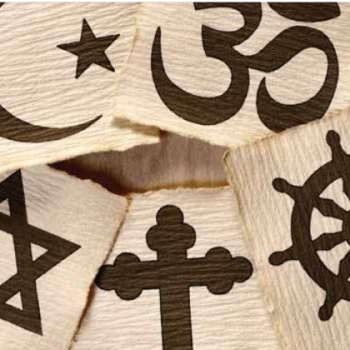Most religions take a dim view of those who are not able to conceive of a reality beyond what they can see, hear, taste or touch. That which might be labeled “metaphysical” or “supernatural” has no place in their lives. While there has been a slight uptick in acceptance by the general public, many Americans would not vote for an atheist to hold political office. Often, the reason stated is that it is believed that such a person would have no moral center. Of course, over our history we have seen how upstanding all those who stood for God and country have behaved so perfectly.
Thoughts on Unbelievers
What is interesting is that some theologies indicate that the eternal destination for those who don’t believe in God is the same as for those who do but belong to a “wrong” religion. Yet, most Americans still prefer the latter to the former. This is often due to the fact that so many Americans can’t really count a secularist among their acquaintances. Well, at least they never have engaged in a deep enough conversation with said acquaintances to discover their beliefs or lack thereof.
It’s important to note that Judaism has a toleration for secular beliefs since a person is Jewish just because their maternal forebears were. Nonbelief does not strip one of a Jewish identity. But that is a subject for a Jew to address. I’m including a mention here just to acknowledge that I’m aware of their tradition. So let’s talk about Hinduism.
The Various Schools of Thought
The Hindu Dharma is quite vast in its variety and complexity. While most will acknowledge an Absolute Oneness (we can call it Brahman or God), there are elements of polytheism, henotheism, panentheism and much more. It can be divided into various sects, denominations, movements and so on, but they all boil down to affiliation with one or more of 6 darshanas or schools of philosophy/theology.
They include Vedanta, Yoga, Sankya, Mimamsa, Nyasa and Vaishesika. Of these, the last 2 for centuries held no concept of Divinity. It is true that both evolved to acknowledge some form of a Creator/Manifestor, but what is key is that the idea of God should never be imposed upon someone who is unable to logically conceive of such a reality. Logical deduction is key to both schools of thought. I won’t get into the very high-minded philosophy of these systems here, but it’s important to know they exist.
Those who belong to more doctrinaire religions have sometimes complained that Hinduism and other worldviews allow adherents to “believe what they want to believe.” This is not the case at all. The Dharma does allow the individual to believe what they are able to believe. To emotionally or psychically pressure someone to believe what they might otherwise discard is seen as a form of spiritually fear-based coercion.
Admiring Honest Seekers
In my association with Secularists of various stripes, I have found one thing to be true in most cases. These are not spiritually or philosophically lazy people. Most have been raised in a faith that they rejected after a great deal of inner work, research and often at a cost of personal relationships. Believe me, I appreciate my time with them much more than those who lazily identify with a religion by inheritance alone.
Recently I threw my hat into the ring for nomination of Husband of the Year by fulfilling my wife’s years-long request to clean out our upper-level dungeon (also known as the attic). This is the 1st time a solid cleansing has been done to that space since we moved in 25 years ago. Jealous, ladies?
Serious Deep Clean
Well, one thing about deep cleaning is that it cannot be done without removing everything, I mean everything, from the attic, closet or basement. You can’t just work around clutter. Anything less is just a lick and a promise. I maintain that when we are serious about doing progressive spiritual work we have to do something similar.
We must be willing to remove every preconceived notion, doctrine, dogma, theological concept and epistemological guess from the dusty haunts of our minds and hearts.
As a matter of fact, I encourage everyone to become an atheist. It could be for only 10 minutes, but it’s an important step. During a deep clean God can be clutter as well.
Once my attic was emptied I sorted everything into piles. What must go to landfill? As little as possible, of course. What can be sold? What can be given away? What can be recycled? And if I can change the analogy from attic to closet, think of how great it feels to discard all those old, worn clothes and replace them with fresh, new ensembles.
So it is with our beliefs and practices. What no longer serves us? What do we really no longer believe but pretend to? And what might we want to add to replace that which we’ve discarded?
Final Thoughts

Many religious people struggle with doubts about all sorts of beliefs, including the existence of God. And to make matters worse, they think that having a doubt in the 1st place is a sign of rebellion that might be punished.
In Hindu Dharma we acknowledge and celebrate the freedom to believe what are capable of, knowing that all spiritual efforts, including doubt, lead to moksha (liberation).












